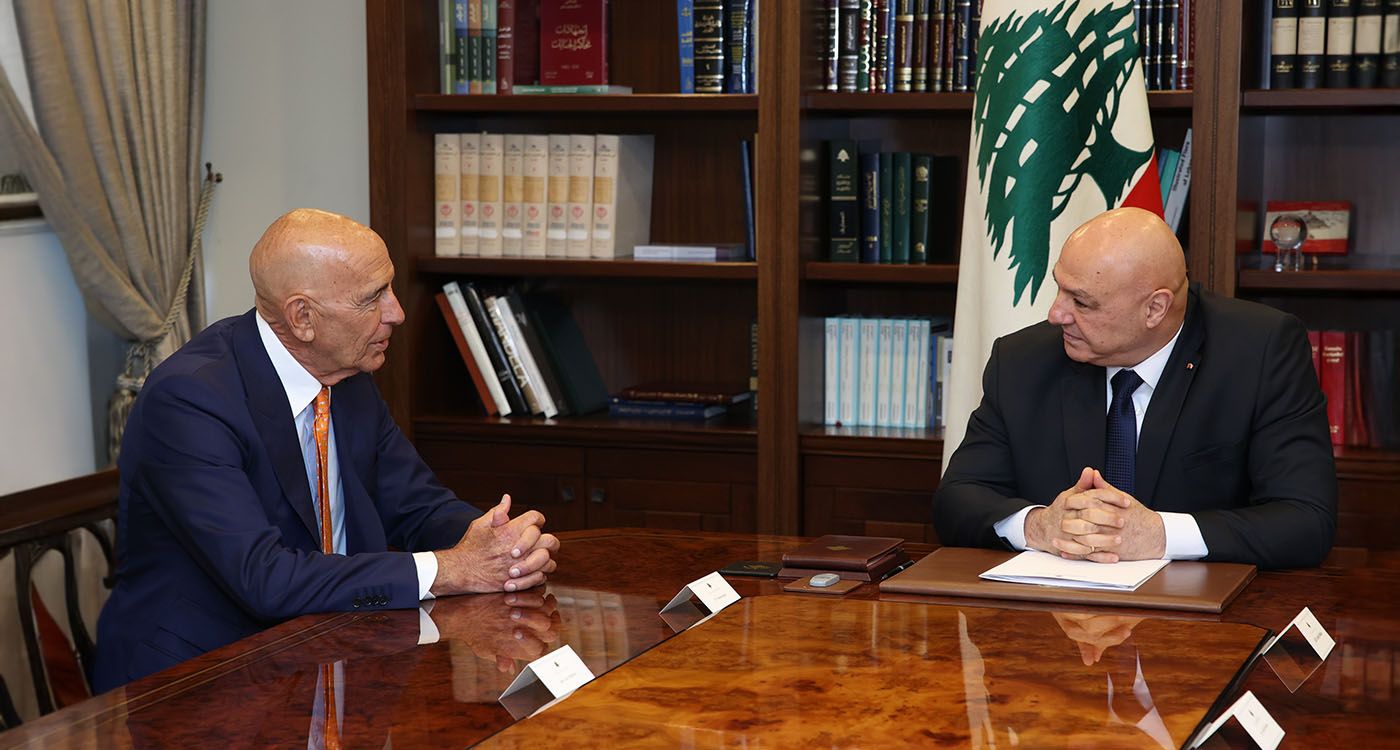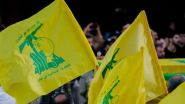
US Special Envoy Thomas Barrack delivered a strong message to Lebanese leaders on Monday, urging them to “seize the opportunity” for peace and reform while the region is moving forward on the path of change and the United States remains engaged and supportive.
His remarks to the press followed a meeting with President Joseph Aoun at Baabda Palace, during which he received Lebanon’s official response to the American proposal for the disarmament of Hezbollah. He later held separate meetings with parliament Speaker Nabih Berri and Prime Minister Nawaf Salam.
On his second visit to Lebanon, Barrack acknowledged receipt of Lebanon’s proposed amendments, compiled in a seven-page document, and said he would study them carefully, adding, however, that he was “very pleased” with the swift and measured tone of Lebanon’s reply.
He said the Lebanese government is currently working to address gaps in the ceasefire mechanism with Israel and reaffirmed that “Israel wants peace with Lebanon.”
He stressed that no strict timetable was being imposed on Lebanon. “It is working to arrive at a formula that reflects what it wants—once that’s done, the US will help make it happen.”
The Presidency of the Republic later stated that what was handed to Barrack were “Lebanese proposals for a comprehensive solution.”
“Now Is the Time”
Following an obvious “carrot and stick” policy, the US envoy, who is also Washington’s ambassador in Turkey, emphasized that Lebanon must act now, while conditions are favorable and international support—especially from US President Donald Trump—is still on the table.
“There is an opportunity in the air, and no one is better than the Lebanese at seizing such opportunities,” he said, cautioning that Lebanon would be left behind, as “the region is moving forward, and all the countries around are changing.”
While stressing Trump’s commitment to support Lebanon and help it achieve peace and prosperity, Barrack warned that the US president “does not have much patience.”
“Security and peace are fundamental—no one will come if Lebanon is at war,” he said bluntly.
Hezbollah’s Disarmament: A Lebanese Responsibility
Though the American proposal seeks the disarmament of Hezbollah in exchange for Israel’s withdrawal from occupied hilltops in southern Lebanon, Barrack was clear: the change must come from within.
Answering reporters’ questions, he emphasized that change must be initiated by Lebanon, and that Washington cannot impose “what must be done.” “We are here to help, not dictate.”
Noting that “everyone is tired and worn out from what has happened in recent years,” he said the previous mechanism for de-escalation with Israel “had not followed the right path.”
“Lebanon must learn from the lessons of the Taif Agreement. A new framework is available now, and Lebanon must hold on to it. Every side must be willing to give something up.”
In response to concerns over regional implications, Barrack clarified that the ongoing US-Lebanon dialogue is entirely separate from discussions involving Iran. “There is no link between our talks with Lebanon and Iran,” he affirmed.
Comparing Lebanon’s current hesitation with Syria’s emerging diplomacy, Barrack revealed that dialogue has started between Syria and Israel. He asked: “Why not Lebanon?”
He noted that Syria, despite having fewer resources than Lebanon, has transitioned “from chaos to hope.” Lebanon, he reiterated, risks being “left behind” on the global stage.
Barrack’s message was clear: the US is extending a hand—but Lebanon must take the lead. The country stands at a critical juncture that could shape its security, sovereignty, and future.
According to the office of the Speaker of Parliament, the discussions with Berri were "constructive” and "took into account Lebanon’s interests, its sovereignty, the concerns of all Lebanese, as well as Hezbollah’s demands.”
For his part, Prime Minister Nawaf Salam stated that any steps forward must go hand-in-hand with Israel’s withdrawal and the Lebanese state's “exclusive control over weapons.”
He affirmed that Lebanon’s discussions are rooted in the principles set out in his government’s policy statement, notably that only the state can decide on matters of war and peace.
Salam clarified that there is no “troika” system but rather ongoing coordination among the president, speaker, and prime minister, with new Lebanese proposals under review. He also emphasized that cabinet decisions alone are binding for Lebanon.
Salam noted, as well, that Hezbollah remains committed to the Taif Agreement and the latest ceasefire arrangements—both of which include the principle of exclusive state control over arms, a clause Hezbollah MPs supported.
In the presence of U.S. Ambassador to Lebanon Lisa Johnson, Barack met with Foreign Minister Youssef Rajji to discuss Lebanon’s national aspirations and future regional role.
During the meeting, Rajji reiterated Lebanon’s firm commitment to extending state sovereignty across its entire territory, underlining the people’s aspiration for a unified and fully empowered Lebanese state. He also outlined Lebanon’s vision for its position in the region amid ongoing diplomatic and security challenges.
In parallel, Rajji expressed gratitude to Barack for his initiative and the continued efforts of the U.S. administration to support Lebanon’s institutional recovery, stabilization, and path toward economic development.



Comments